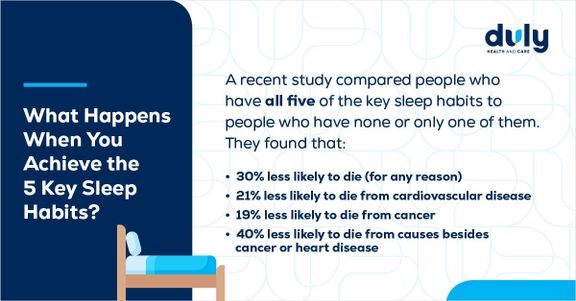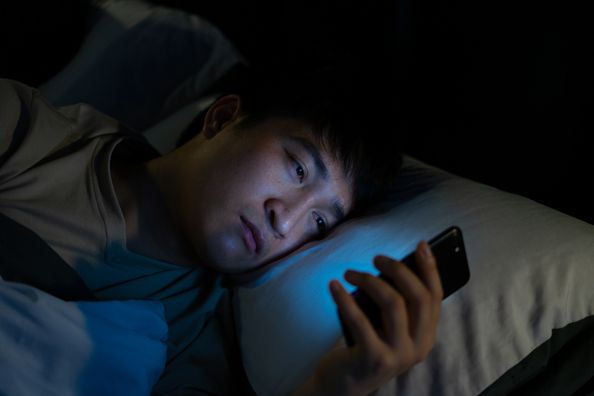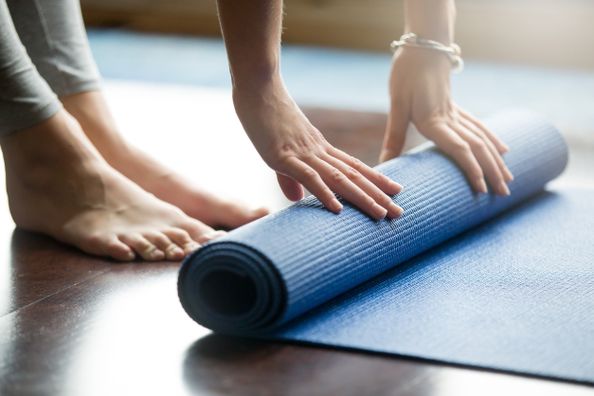You curl up in bed after a long day. You fall asleep instantly and sleep soundly through the night. You wake in the morning, feeling refreshed and ready to go.
If this sounds like a far-off fantasy, you’re in good company. Tens of millions of Americans struggle with ongoing sleep disorders, and almost everyone has had the occasional sleepless night.
Even though it’s not always easy, getting enough sleep — and good quality sleep — is critical. Good sleep improves your physical and mental health and sharpens your brain. And now, a recent study has revealed that quality sleep may increase life expectancy.
The study identified 5 habits of quality sleep:
Falling Asleep Easily
Staying Asleep
Getting 7 to 8 Hours of Sleep
Waking Up Feeling Rested
Not Using Sleep Medications
In the study, having those sleep habits added nearly 2.5 years to a woman’s life, and almost 5 years to a man’s.

These habits might seem simple enough — but in reality, they are often much easier said than done.
Here are 5 steps you can take toward achieving those habits:
1. Improve your sleep environment
All of your surroundings, from the temperature of your room to the background noise to the pile of dirty laundry on the floor can make a difference in the quality of your sleep.
There are many ways to make your room optimal for sleep, such as:
Keeping your room cool, between 60 and 67 degrees Fahrenheit. Your body naturally lowers its temperature to help you fall asleep, and a cool room helps speed along that process.
Turn off your lights. Your body produces a hormone called melatonin that helps you fall asleep — but light can slow down production. You can prep your brain for bedtime by dimming your lights as bedtime approaches.
Clean your room. De-cluttering your room and making your bed every day has been shown to improve sleep.
Reduce noise. A quiet room can help you fall asleep and lower the likelihood of waking up in the middle of the night. If you prefer a little noise, try the whir of a fan or white noise machine. If you live on a busy street, move your bed away from the window.
If you’re able to, invest in a new mattress or more comfortable pillows — comfort can be key when it comes to getting a good night’s sleep.
Also read: Can’t Fall Asleep? It May Be Your Sleep Environment
2. Stop using screens before bed
It can be tempting to spend those few minutes you have to yourself before bed on your phone or watching TV. But while that might seem relaxing, it’s actually riling your body up and making it difficult to sleep.
Screens, like those from smartphones, TVs, and computers, emit a type of light called blue light. The sun also gives off blue light. Blue light can be beneficial during the day, as it can boost your mood and level of alertness. At night, however, it can keep you awake.
Additionally, scrolling through your social media feed or watching a movie can stimulate intense emotions, both positive and negative. This can cause stress and anxiety, and make it harder to fall asleep.
The general recommendation is to avoid screens in the hour or two before bedtime. It may help to keep your phone charging out of arm’s reach.
Also read: Why Am I So Tired?
3. Set a bedtime and wake-up time — and be consistent
The amount of sleep someone needs can vary, but the recent study regarding sleep habits to help you live longer suggests that the magic range is between 7 and 8 hours per night.
This isn’t a recommendation to take lightly. Not getting enough sleep can be detrimental to your health. In the short term, it can reduce alertness, increase moodiness, and raise your risk of drowsy driving and car accidents. Long-term sleep deprivation has been linked to weight gain, high blood pressure, heart or kidney disease, stroke, and depression.
Too much sleep can also cause problems. It can make you feel lethargic and unmotivated the next day and has been associated with health problems like type 2 diabetes and heart disease.
Going to bed and waking up at the same time every day — including on weekends — can help train your body to get the right amount of sleep.
To learn more about improving your sleep habits and getting a better night’s sleep, make an appointment with a Duly Health and Care sleep medicine specialist.
4. Use sleep medications sparingly.
Over-the-counter sleeping pills aren’t quite as promising as they seem. The pills are supposed to make you feel sedated by blocking certain chemicals in your brain. However, they are usually not very effective and they can make you feel drowsy the next day. Even if pills do work for you, it’s easy to become tolerant of them — which means they’re no longer effective.
Be careful with melatonin supplements, too. While they may help with insomnia and are usually safe in the short term, there isn’t enough information about long-term use. They’re not regulated by the US Food and Drug Administration (FDA), and their labels are often inaccurate or misleading.
There is an exception: If your provider prescribes sleep medication, you may be able to take it on a more regular basis. Always follow your provider’s advice for taking medication safely.
5. Get a sleep test.
While it’s normal to occasionally struggle with a bout of insomnia or wake up feeling like you need an extra 10 hours of sleep, sleep problems that won’t go away shouldn’t be ignored.
Your provider may want to order a sleep study. This is a test that evaluates your sleep patterns by measuring factors such as your:
Airflow
Blood oxygen level
Brain waves
Eye movements
Heart rate
Snoring or other noises
A sleep study helps your provider diagnose disorders like sleep apnea, narcolepsy, periodic limb movement disorder, or other unusual behaviors that occur during sleep.
Whether you need a sleep study, a prescription sleep aid, or advice on improving your sleep habits, your primary care provider or a sleep specialist can help. Changing your habits isn’t always easy, but the results will be more than worth it.
Happy snoozing!
Health Topics:








